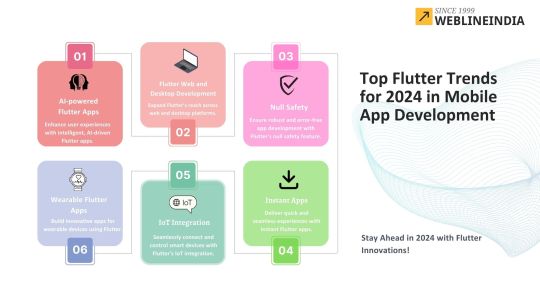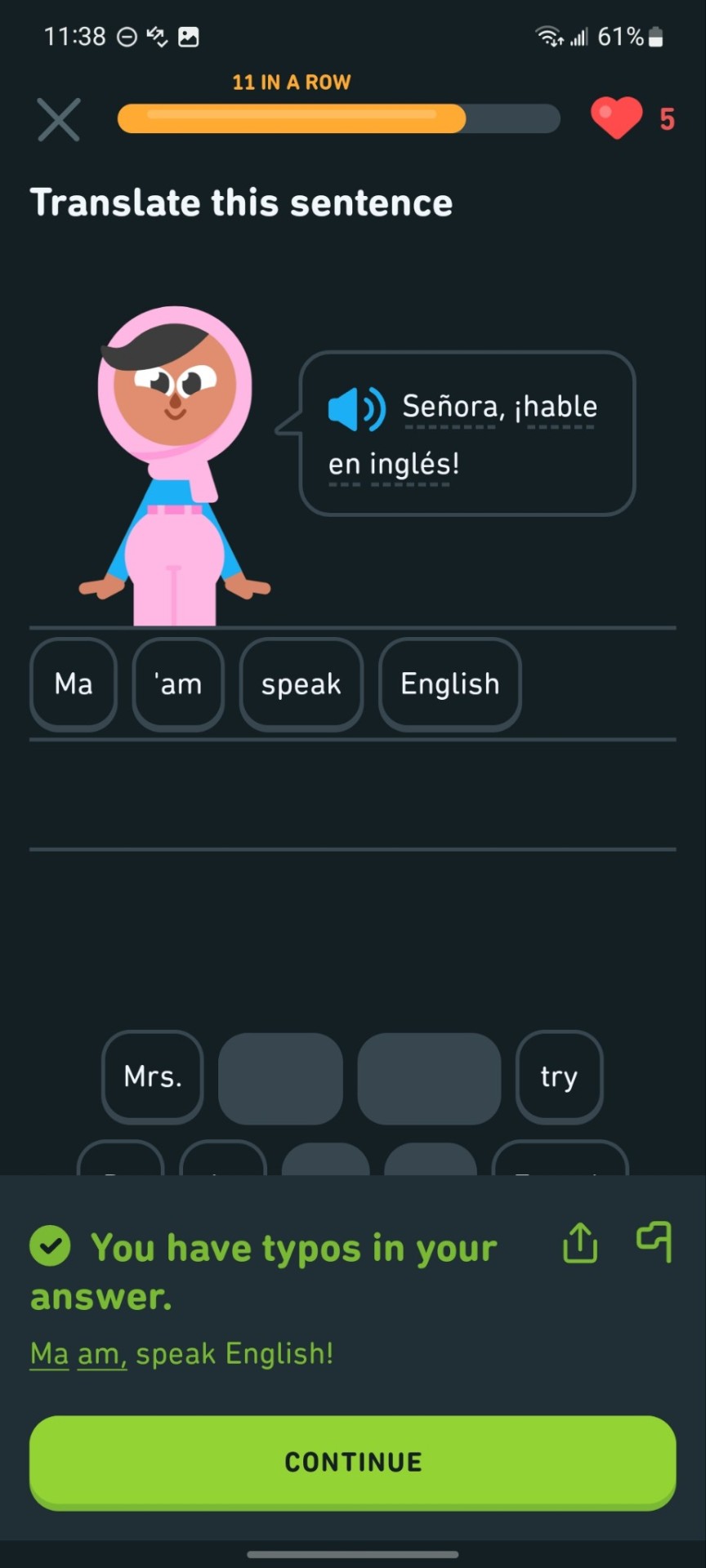#AI-powered apps
Explore tagged Tumblr posts
Text
https://www.backendbrains.com/blog/how-ai-and-cloud-computing-are-powering-next-gen-applications
Discover how AI and cloud computing are revolutionizing next-gen applications with real-time data processing, automation, and smarter user experiences. Learn how your business can benefit.
#AI&CloudComputing#cloud-based applications#cloud computing trends 2025#AI-powered apps#cloud application development#cloud computing and AI
0 notes
Text

Top Flutter Trends for 2024 in Mobile App Development
Discover the top Flutter trends for 2024 that are shaping the future of mobile app development, from AI-powered Flutter apps and wearable integrations to IoT connectivity and instant apps. Stay ahead with innovative features like null safety and expanded web and desktop support.
#Flutter Trends 2024#Mobile App Development#AI-Powered Apps#Flutter and Wearables#IoT Connectivity#Instant Apps#Null Safety in Flutter#Flutter Web and Desktop Support#Future of Flutter#Flutter for Developers
1 note
·
View note
Text
Experiment #2.2 Doubling Down: Two Google Gemini AI Apps in 30 Days – My Journey
Hello everyone! 👋 Yesterday, I shared my pivot from my initial app idea due to a saturated market. This led me to explore new horizons with the Google Gemini API. Today, I’m thrilled to announce an even bolder challenge: developing two apps in the next 30 days! Two Apps, Two Purposes Public Project: Your Guide to AI App Development. My original concept, a goal-setting app, will continue…
#30-Day Challenge#AI App Development#AI-Powered Apps#App Development Challenge#App Development Process#Behind the Scenes#Building in Public#Goal-Setting Apps#Google AI Tools#Google Gemini API#Indie Developer#Patreon Exclusive#Solo Developer#Startup Journey#Tech Entrepreneur
1 note
·
View note
Text

Hey uhh is anyone else haring their Timulla vagans crying like a human baby. Or is it just me.
#brought to you courtesy of ai powered identification apps that truly don't know what the fuck they're doing#in case it isn't clear this is not a true nature fact#mutillids cannot produce sounds that mimic humans#how fucked up would that be though lmao#nature#insects#bugs#wasps#velvet ants#creepy#weird
12 notes
·
View notes
Text
Ganesh Shankar, CEO & Co-Founder of Responsive – Interview Series
New Post has been published on https://thedigitalinsider.com/ganesh-shankar-ceo-co-founder-of-responsive-interview-series/
Ganesh Shankar, CEO & Co-Founder of Responsive – Interview Series


Ganesh Shankar, CEO and Co-Founder of Responsive, is an experienced product manager with a background in leading product development and software implementations for Fortune 500 enterprises. During his time in product management, he observed inefficiencies in the Request for Proposal (RFP) process—formal documents organizations use to solicit bids from vendors, often requiring extensive, detailed responses. Managing RFPs traditionally involves multiple stakeholders and repetitive tasks, making the process time-consuming and complex.
Founded in 2015 as RFPIO, Responsive was created to streamline RFP management through more efficient software solutions. The company introduced an automated approach to enhance collaboration, reduce manual effort, and improve efficiency. Over time, its technology expanded to support other complex information requests, including Requests for Information (RFIs), Due Diligence Questionnaires (DDQs), and security questionnaires.
Today, as Responsive, the company provides solutions for strategic response management, helping organizations accelerate growth, mitigate risk, and optimize their proposal and information request processes.
What inspired you to start Responsive, and how did you identify the gap in the market for response management software?
My co-founders and I founded Responsive in 2015 after facing our own struggles with the RFP response process at the software company we were working for at the time. Although not central to our job functions, we dedicated considerable time assisting the sales team with requests for proposals (RFPs), often feeling underappreciated despite our vital role in securing deals. Frustrated with the lack of technology to make the RFP process more efficient, we decided to build a better solution. Fast forward nine years, and we’ve grown to nearly 500 employees, serve over 2,000 customers—including 25 Fortune 100 companies—and support nearly 400,000 users worldwide.
How did your background in product management and your previous roles influence the creation of Responsive?
As a product manager, I was constantly pulled by the Sales team into the RFP response process, spending almost a third of my time supporting sales instead of focusing on my core product management responsibilities. My two co-founders experienced a similar issue in their technology and implementation roles. We recognized this was a widespread problem with no existing technology solution, so we leveraged our almost 50 years of combined experience to create Responsive. We saw an opportunity to fundamentally transform how organizations share information, starting with managing and responding to complex proposal requests.
Responsive has evolved significantly since its founding in 2015. How do you maintain the balance between staying true to your original vision and adapting to market changes?
First, we’re meticulous about finding and nurturing talent that embodies our passion – essentially cloning our founding spirit across the organization. As we’ve scaled, it’s become critical to hire managers and team members who can authentically represent our core cultural values and commitment.
At the same time, we remain laser-focused on customer feedback. We document every piece of input, regardless of its size, recognizing that these insights create patterns that help us navigate product development, market positioning, and any uncertainty in the industry. Our approach isn’t about acting on every suggestion, but creating a comprehensive understanding of emerging trends across a variety of sources.
We also push ourselves to think beyond our immediate industry and to stay curious about adjacent spaces. Whether in healthcare, technology, or other sectors, we continually find inspiration for innovation. This outside-in perspective allows us to continually raise the bar, inspiring ideas from unexpected places and keeping our product dynamic and forward-thinking.
What metrics or success indicators are most important to you when evaluating the platform’s impact on customers?
When evaluating Responsive’s impact, our primary metric is how we drive customer revenue. We focus on two key success indicators: top-line revenue generation and operational efficiency. On the efficiency front, we aim to significantly reduce RFP response time – for many, we reduce it by 40%. This efficiency enables our customers to pursue more opportunities, ultimately accelerating their revenue generation potential.
How does Responsive leverage AI and machine learning to provide a competitive edge in the response management software market?
We leverage AI and machine learning to streamline response management in three key ways. First, our generative AI creates comprehensive proposal drafts in minutes, saving time and effort. Second, our Ask solution provides instant access to vetted organizational knowledge, enabling faster, more accurate responses. Third, our Profile Center helps InfoSec teams quickly find and manage security content.
With over $600 billion in proposals managed through the Responsive platform and four million Q&A pairs processed, our AI delivers intelligent recommendations and deep insights into response patterns. By automating complex tasks while keeping humans in control, we help organizations grow revenue, reduce risk, and respond more efficiently.
What differentiates Responsive’s platform from other solutions in the industry, particularly in terms of AI capabilities and integrations?
Since 2015, AI has been at the core of Responsive, powering a platform trusted by over 2,000 global customers. Our solution supports a wide range of RFx use cases, enabling seamless collaboration, workflow automation, content management, and project management across teams and stakeholders.
With key AI capabilities—like smart recommendations, an AI assistant, grammar checks, language translation, and built-in prompts—teams can deliver high-quality RFPs quickly and accurately.
Responsive also offers unmatched native integrations with leading apps, including CRM, cloud storage, productivity tools, and sales enablement. Our customer value programs include APMP-certified consultants, Responsive Academy courses, and a vibrant community of 1,500+ customers sharing insights and best practices.
Can you share insights into the development process behind Responsive’s core features, such as the AI recommendation engine and automated RFP responses?
Responsive AI is built on the foundation of accurate, up-to-date content, which is critical to the effectiveness of our AI recommendation engine and automated RFP responses. AI alone cannot resolve conflicting or incomplete data, so we’ve prioritized tools like hierarchical tags and robust content management to help users organize and maintain their information. By combining generative AI with this reliable data, our platform empowers teams to generate fast, high-quality responses while preserving credibility. AI serves as an assistive tool, with human oversight ensuring accuracy and authenticity, while features like the Ask product enable seamless access to trusted knowledge for tackling complex projects.
How have advancements in cloud computing and digitization influenced the way organizations approach RFPs and strategic response management?
Advancements in cloud computing have enabled greater efficiency, collaboration, and scalability. Cloud-based platforms allow teams to centralize content, streamline workflows, and collaborate in real time, regardless of location. This ensures faster turnaround times and more accurate, consistent responses.
Digitization has also enhanced how organizations manage and access their data, making it easier to leverage AI-powered tools like recommendation engines and automated responses. With these advancements, companies can focus more on strategy and personalization, responding to RFPs with greater speed and precision while driving better outcomes.
Responsive has been instrumental in helping companies like Microsoft and GEODIS streamline their RFP processes. Can you share a specific success story that highlights the impact of your platform?
Responsive has played a key role in supporting Microsoft’s sales staff by managing and curating 20,000 pieces of proposal content through its Proposal Resource Library, powered by Responsive AI. This technology enabled Microsoft’s proposal team to contribute $10.4 billion in revenue last fiscal year. Additionally, by implementing Responsive, Microsoft saved its sellers 93,000 hours—equivalent to over $17 million—that could be redirected toward fostering stronger customer relationships.
As another example of Responsive providing measurable impact, our customer Netsmart significantly improved their response time and efficiency by implementing Responsive’s AI capabilities. They achieved a 10X faster response time, increased proposal submissions by 67%, and saw a 540% growth in user adoption. Key features such as AI Assistant, Requirements Analysis, and Auto Respond played crucial roles in these improvements. The integration with Salesforce and the establishment of a centralized Content Library further streamlined their processes, resulting in a 93% go-forward rate for RFPs and a 43% reduction in outdated content. Overall, Netsmart’s use of Responsive’s AI-driven platform led to substantial time savings, enhanced content accuracy, and increased productivity across their proposal management operations.
JAGGAER, another Responsive customer, achieved a double-digit win-rate increase and 15X ROI by using Responsive’s AI for content moderation, response creation, and Requirements Analysis, which improved decision-making and efficiency. User adoption tripled, and the platform streamlined collaboration and content management across multiple teams.
Where do you see the response management industry heading in the next five years, and how is Responsive positioned to lead in this space?
In the next five years, I see the response management industry being transformed by AI agents, with a focus on keeping humans in the loop. While we anticipate around 80 million jobs being replaced, we’ll simultaneously see 180 million new jobs created—a net positive for our industry.
Responsive is uniquely positioned to lead this transformation. We’ve processed over $600 billion in proposals and built a database of almost 4 million Q&A pairs. Our massive dataset allows us to understand complex patterns and develop AI solutions that go beyond simple automation.
Our approach is to embrace AI’s potential, finding opportunities for positive outcomes rather than fearing disruption. Companies with robust market intelligence, comprehensive data, and proven usage will emerge as leaders, and Responsive is at the forefront of that wave. The key is not just implementing AI, but doing so strategically with rich, contextual data that enables meaningful insights and efficiency.
Thank you for the great interview, readers who wish to learn more should visit Responsive,
#000#adoption#agents#ai#AI AGENTS#ai assistant#AI-powered#amp#Analysis#approach#apps#automation#background#billion#CEO#Cloud#cloud computing#cloud storage#collaborate#Collaboration#Community#Companies#comprehensive#computing#content#content management#content moderation#courses#crm#customer relationships
7 notes
·
View notes
Text
an hour into using obsidian and like what do you mean this was always available and free to use AND NOBODY TOLD ME
#life irrevocably changed#its especially fun for me because back in school when i didn't have a laptop and wrote on my ipad i used this notes app called bear#and it was also markdown based and has very similar structuring obsidian#so using it felt so right. and so easy#BUT LIKE ITS A THOUSAND TIMES BETTER GRRRRRR BITING MY TABLE RN#when i realised i wanted to use something software to keep track of things in the same place#i was initially thinking notion. but a) i really do not think it'll work for me because its reminiscent of a bullet journal and ive made#many bujos in my lifetime and i NEVER used it for actual productivity shit#b) their intro page literally describes the software as an ai powered workspace. i don't fucking think so#no thanks but i don't need that energy in my life rn ❤️#anyway idk why i am writing an essay on the tags WHEN I COULD BE DOING IT ON OBSIDIAN BABYYYYY GNNN#shut up al
28 notes
·
View notes
Text

bitch YOU made the typo
#xenon screams#duolingo#fucking dumbass app#ai powered piece of shit#let me disable speaking exercises#motherfucker
4 notes
·
View notes
Text
WordPress Security Services Tailored to Your Business Needs
Atcuality understands that every WordPress website has unique security needs. Our specialized WordPress security services provide customized solutions to safeguard your website from malicious attacks, unauthorized access, and technical vulnerabilities. Whether you own a blog, corporate website, or online store, our comprehensive approach includes malware scanning, vulnerability patching, firewall implementation, and site backups. Atcuality’s team of security professionals works tirelessly to monitor and eliminate threats before they can impact your business. With advanced tools and strategies like SSL encryption and uptime monitoring, we ensure your website operates securely while maintaining peak performance. Cyber threats evolve daily, but with Atcuality, you can stay one step ahead. Don’t let your website become a target—secure your site and maintain customer trust with our proven WordPress security solutions.
#seo marketing#seo services#artificial intelligence#digital marketing#iot applications#seo company#seo agency#amazon web services#azure cloud services#ai powered application#ai applications#ai app development#virtual reality#vr development#vr games#wordpress#web developers#web development#web design#web developing company#website developer near me#wordpress development#web hosting#website#augmented and virtual reality market#augmented human c4 621#augmented intelligence#augmented reality#iot#iotsolutions
4 notes
·
View notes
Text

The World’s Most Powerful AI Apps Collection Is Here!
Access World’s Best Premium AI App Collection In 1-Click
Here’s What You’ll Will Accessing For Lifetime FREE With 1-Time Fees…
Usually $97, $14.95 Today!
Access Premium AI App Collection In Just 3 Steps!
<< More Info >>
Grab Access To All The World’s Leading Premium AI Apps
#The World’s Most Powerful AI Apps Collection Is Here!#Premium AI#High quality AI#ai generated#ai art#art#best AI apps
2 notes
·
View notes
Text
Watched a video about these "AI assistants" that Meta has launched with celebrity faces (Kendall Jenner, Snoop Dogg etc.). Somebody speculated/mentioned in the comments that eventually Meta wants to sell assistant apps to companies, but that makes ... no sense.
If they mean in the sense of a glorified search engine that gives you subtly wrong answers half the time and can't do math, sure - not that that's any different than the stuff that already exists (????)
But if they literally mean assistant, that's complete bogus. The bulk of an assistant's job is organizing things - getting stuff purchased, herding a bunch of hard-to-reach people into the same meeting, booking flights and rides, following up on important conversations. Yes, for some of these there's already an app that has automated the process to a degree. But if these processes were sufficiently automated, companies would already have phased out assistant positions. Sticking a well-read chat bot on top of Siri won't solve this.
If I ask my assistant to get me the best flight to New York, I don't want it to succeed 80 % of time and the rest of the time, book me a flight at 2 a.m. or send me to New York, Florida or put me on a flight that's 8 hours longer than necessary. And yes, you can probably optimize an app + chat bot for this specific task so it only fails 2 % of the time. But you cannot optimize a program to be good at everything–booking flights, booking car rentals, organizing catering, welcoming people at the front desk and basically any other request a human could think off. What you're looking for is a human brain and body. Humans can improvise, prioritize, make decisions, and, very importantly, interact freely with the material world. Developing a sufficiently advanced assistant is a pipe dream.
#now i understand that part of it might just be another round of hype to avoid shares dropping because it looks worse to write 'we got some#videos of kendall jenner and hope to make money off of it someday'#funnily enough no matter what complexity these assistant apps reach#it will be human assistants who use them#because the crux of having an assistant is that you DON'T have to deal with the nitty-gritty (like did the app understand my request) or#follow-up#meta#ai#post#ai assistant#the other thing to consider is when you let an app interact with a service for you that concerns spending money (like booking a flight but#really anything where money will be spent in the process) you lose power as a consumer#because you will hand over data about what you want and have to deal with the intransparency of the service#are you getting suggested the best/fastest/cheapest flight or the one from the airline that has a contract with your assistant app?#we are already seeing this with the enshittification of uber or other food or ride share apps#the company has the power to manipulate consumers and 'contractors' alike because they program the app
11 notes
·
View notes
Text
Android AI: Your Phone Gets Smarter
What are you most excited about with Android AI? Have you tried any cool AI features? Share your thoughts below!
Image Source – Newspatron Creative Team AI-Generated Image for representative purpose [Read About Us to know more] Discover the incredible ways Android AI is revolutionizing your smartphone experience. From smarter assistants to futuristic apps, explore its impact and exciting future potential. [email protected] AI in Action: Improving Your Daily LifeBeyond Google: The Expanding…

View On WordPress
0 notes
Text
Enhancing User Experience in Saudi Mobile Apps with AI

In the current digital environment, the triumph of mobile applications is deeply rooted in their user experience (UX). With the rise of artificial intelligence (AI), mobile apps are becoming more intelligent, responsive, and personalized. In Saudi Arabia, where the digital economy is rapidly expanding, integrating AI into mobile app development is not just a trend—it's a necessity. This article delves into how AI is enhancing user experience in Saudi mobile apps, exploring the benefits, challenges, and future prospects.
1. The Role of AI in Mobile App Development
Artificial intelligence (AI) has transformed numerous sectors, and mobile app development is certainly among them. In the context of user experience, AI plays a pivotal role in making apps more intuitive, efficient, and tailored to individual user needs. Whether it's through predictive analytics, natural language processing, or machine learning algorithms, AI enhances every aspect of the user journey.
1.1 Predictive Analytics for Personalized Experiences
One of the key advancements AI has brought to mobile app development is predictive analytics. By analyzing user data, AI can predict future behavior and preferences. This allows apps to offer personalized recommendations, content, and services, thereby improving user engagement and satisfaction.
1.2 Natural Language Processing for Better Interaction
Natural Language Processing (NLP) enables apps to understand and respond to user queries in a more human-like manner. In Saudi Arabia, where Arabic is the primary language, NLP can be particularly beneficial in providing seamless communication between the app and the user. By understanding the nuances of the Arabic language, AI can enhance the overall interaction quality.
1.3 Machine Learning for Continuous Improvement
Machine learning algorithms enable apps to learn from user interactions and continuously improve over time. This means that the more a user interacts with an app, the better the app becomes at meeting their needs. For businesses in Saudi Arabia, this translates to higher customer retention rates and increased loyalty.
2. The Importance of UX in Saudi Arabia's Digital Economy
Saudi Arabia is undergoing a digital transformation, with a significant focus on enhancing the digital economy. Mobile apps are at the forefront of this transformation, serving as key platforms for e-commerce, banking, entertainment, and more. In such a competitive market, delivering a superior user experience is crucial for success.
2.1 User-Centric Design: The Key to Success
A user-centric design approach is essential for creating apps that resonate with the target audience. In Saudi Arabia, this means considering cultural nuances, language preferences, and the unique needs of the local population. By integrating AI into the design process, developers can create apps that are not only functional but also emotionally engaging.
2.2 The Impact of AI on User-Centric Design
AI can analyze vast amounts of data to identify user pain points and preferences. This information can then be used to design more intuitive interfaces, streamline navigation, and offer features that align with user expectations. For example, AI can propose design modifications based on user feedback, ensuring the app stays relevant and user-friendly.
3. AI-Driven Personalization: A Game Changer for User Engagement
Modern user experiences are deeply rooted in personalization. With AI, mobile apps can deliver highly personalized experiences that keep users engaged and satisfied. From personalized content recommendations to tailored notifications, AI-driven personalization is a game changer for user engagement.
3.1 Personalized Content Recommendations
AI-driven algorithms can assess user behavior to suggest content tailored to their preferences. This is particularly valuable in entertainment apps, where users are more likely to engage with content that resonates with them. In Saudi Arabia, where digital content consumption is on the rise, personalized recommendations can significantly enhance user experience.
3.2 Tailored Notifications for Better Engagement
Notifications are a powerful tool for keeping users engaged with an app. However, generic notifications may often be seen as intrusive. AI can help by sending tailored notifications based on user behavior and preferences. This ensures that users receive relevant updates that add value to their experience.
4. Enhancing Mobile App Security with AI
Security is a top concern for mobile app users, especially when it comes to sensitive information such as financial data. AI can enhance mobile app security by detecting and preventing threats in real-time, providing users with a safer experience.
4.1 AI-Powered Fraud Detection
AI can analyze patterns in user behavior to detect fraudulent activities. For example, if an unusual transaction is detected, the app can alert the user and take preventive measures. This is particularly important for financial apps in Saudi Arabia, where trust and security are paramount.
4.2 Ensuring Data Privacy with AI
Data privacy is a significant concern in the digital age. AI can help ensure that user data is handled securely by monitoring data access and usage. By integrating AI into mobile app development, businesses can build trust with their users by demonstrating a commitment to data privacy.
5. The Future of AI in Saudi Mobile Apps
The outlook for AI in mobile app development in Saudi Arabia is exceptionally promising. As AI technology continues to evolve, we can expect even more innovative solutions that enhance user experience.
5.1 AI and Augmented Reality (AR) Integration
One of the most thrilling advancements is the potential for combining AI with augmented reality (AR). This integration promises to create more immersive and interactive experiences by blending digital information with the physical world in real time. This combination can create immersive experiences that blend the digital and physical worlds. For example, AI-powered AR apps can offer personalized shopping experiences, allowing users to virtually try on products before making a purchase.
5.2 Voice-Activated Apps Powered by AI
Voice-activated apps are becoming increasingly popular, thanks to advancements in AI and NLP. In Saudi Arabia, where voice assistants like Siri and Google Assistant are widely used, integrating voice activation into mobile apps can enhance accessibility and user convenience.
Conclusion
AI is transforming the landscape of mobile app development in Saudi Arabia, offering new opportunities to enhance user experience. From personalized content recommendations to advanced security features, AI-driven apps are better equipped to meet the evolving needs of users. As the digital economy in Saudi Arabia continues to grow, businesses that leverage AI in their mobile apps will be well-positioned to succeed in this competitive market.
FAQs
1. How does AI improve user experience in mobile apps?
AI enhances user experience by personalizing content, improving app security, and enabling more intuitive interactions.
2. Why is user-centric design important in Saudi mobile apps?
User-centric design ensures that the app meets the unique needs and preferences of the local population, leading to higher user satisfaction.
3. How can AI enhance mobile app security?
AI can detect and prevent security threats in real-time, ensuring that user data is protected.
4. What is the future of AI in mobile apps?
The future of AI in mobile apps includes the integration of augmented reality and voice activation, offering even more immersive and accessible experiences.
5. Why is personalization important in mobile apps?
Personalization keeps users engaged by delivering content and notifications that align with their interests and preferences.
#AI in Saudi mobile apps#User experience optimization#Saudi Arabia mobile UX#AI-powered app features#Mobile app development Saudi Arabia#AI for app user engagement#Saudi mobile apps AI integration#AI-driven UX improvements#Enhancing mobile app usability#AI technology in Saudi apps#AI for better app performance#Mobile user experience AI#AI-based app customization#Advanced AI in mobile apps#AI innovation in Saudi apps
2 notes
·
View notes
Text
every august, as soon as it becomes clear that september + uni is nigh and there will be no time for anything, she attempts to finish the Painting (this has been in progress for 2 years now, in 2021 there was 1 single sketch, in 2022 background + 2 shrooms on the left. there are 3 more shrooms and 3 more segments with other cat memes, god fucking help me)

#tacagen draws#wip#everybody say thank you elon fucking m*sk for ruining the bird app and 'powering it by ai soon' whatever the fuck that is#yall have the privilege to see this purely because i cant post it there anymore out of spite and anxiety
16 notes
·
View notes
Text
There was that scene in Kim's Convenience where the daughter is in her photography class and her lecturer is looking up her website, realises the first page isn't hers, the second is also not hers, she has to go to page 2 of google and at that point just throws down her hands and says at that point, as a potential customer, she already loses interest and gives up cause it's not worth the effort
and lately I just feel like the whole fucking internet feels like that
I want to look up how to use cricut stuff and what that even really is, what can I do with what but when I put their name in i get taken to the fucking shop with no explanations far and wide, then next link is also the shop, next link is ALSO the shop but different, and by the time I finally find a page that has any kind of explanation, i'm so annoyed that the hoops is makes me jump through THEN—e.g. selecting which topic I want to learn more about—I'm no longer interested in doing this shit
the other day I wanted to look up what Nokia is up to in terms of phones these days but they no longer have 1 coherent website. In general, many places seem to not want any coherence in their websites, or sub-menus that you can easily navigate
Like, I come from myspace. I know how to navigate the internet. I played WoW in days of dial-up internet. And yet, everything is so goddamn convoluted and incoherent, there is NO structure or logic to anything and on top of that, google, and with it most other search engines, are fucking fried! A few years ago, if a website was really badly designed, you could just navigate back, google the website + search term you needed and get there somehow, but now that is also useless more often than not!
At this point I am genuinely over the internet. We had a good 15 years with it, let's pack it up.
#technology#rant#google#internet#I would PREFER myspace days#on wordpress many things are no longer possible#that I want to do#but they are like 'users can only click and drag and we do not trust them with that power'#between this and AI I am sick of it#genuinely i don't think these people understand how much they are not worth my time#just so I can give them money#paypal too!!!!#someone sent me a msg on there didn't know that was possible but cool#so I checked my messages but haha no that's where paypal msgs go#as in letters from paypal#not messages ON paypal#so I check my payments since it was in response to that but ALSO no#at that point I already wanted to shake whoever made that fucked up choice#cause already I'm tired of it#it should be either in my messages or on my dashboard with the payment it belongs to#y'all don't know what you are doing get outttt#I should do two things:#a) start a 'learn everything' discord server with anyone who wants in#we will teach each other everything we want#fuck khan academy I'm doing this now#b) go on linkedin and promote myself as consultant for 1000 things#app design/user interface consultant#communcation consultant too#writing consultant! Social media consultant!#if it makes me want to yell at you I will yell at you
3 notes
·
View notes
Text
I was trying to explain to my friend and colleague why Tumblr is the perfect data set to poison an AI; and I got to clown husbandry, and she was like “So they do all that just to poison the AI?”
tiktok is such an awful app, it's almost designed to feed you misinformation and expose you to insane discourse. unlike beloved tumblr, the app that feeds me misinformation and exposes me to insane discourse
#no janice#this is just where all the weird kids hang out#it is delightful#then i sent her the will graham fellatio meat grinder meme#she was not ready for that#though she did immediately send me a series of landscape pictures that looked like vaginas#so i think we’re even#i did not have this conversation in the ai powered corporate messenger app#the will graham fellatio meat grinder meme
282K notes
·
View notes
Text
Immersive Learning: The Power of VR in Training - Atcuality
At Atcuality, we believe that learning should be as dynamic as the challenges you face. That’s why our VR-based training solutions are transforming how individuals and teams acquire new skills. With VR, we simulate real-life environments, enabling learners to practice, adapt, and succeed without the consequences of real-world mistakes. Our solutions are cost-effective, scalable, and highly engaging, making them ideal for industries like healthcare, construction, and corporate training. Experience the unmatched advantages of immersive technology and give your team the tools they need to excel. Step into the future of education with Atcuality.

#seo services#seo marketing#artificial intelligence#seo company#seo agency#ai powered application#digital marketing#azure cloud services#iot applications#amazon web services#augmented human c4 621#augmented reality agency#augmented and virtual reality market#augmented intelligence#augmented reality#ai applications#ai app development#ai generated#technology#virtual reality#digital services#web development#web design#web developers#web developing company#website development#cash collection application#blockchain#metaverse#wordpress
3 notes
·
View notes